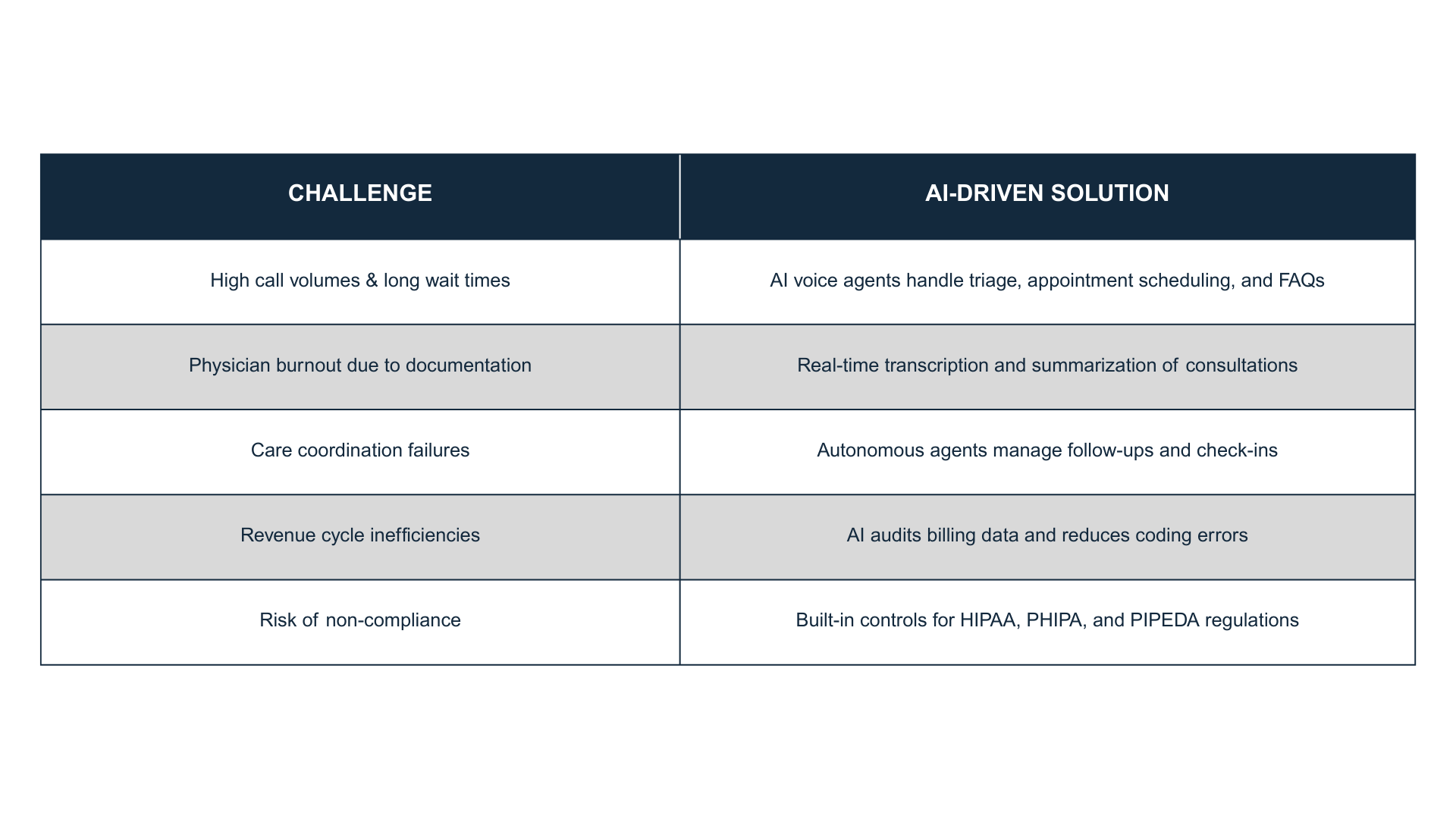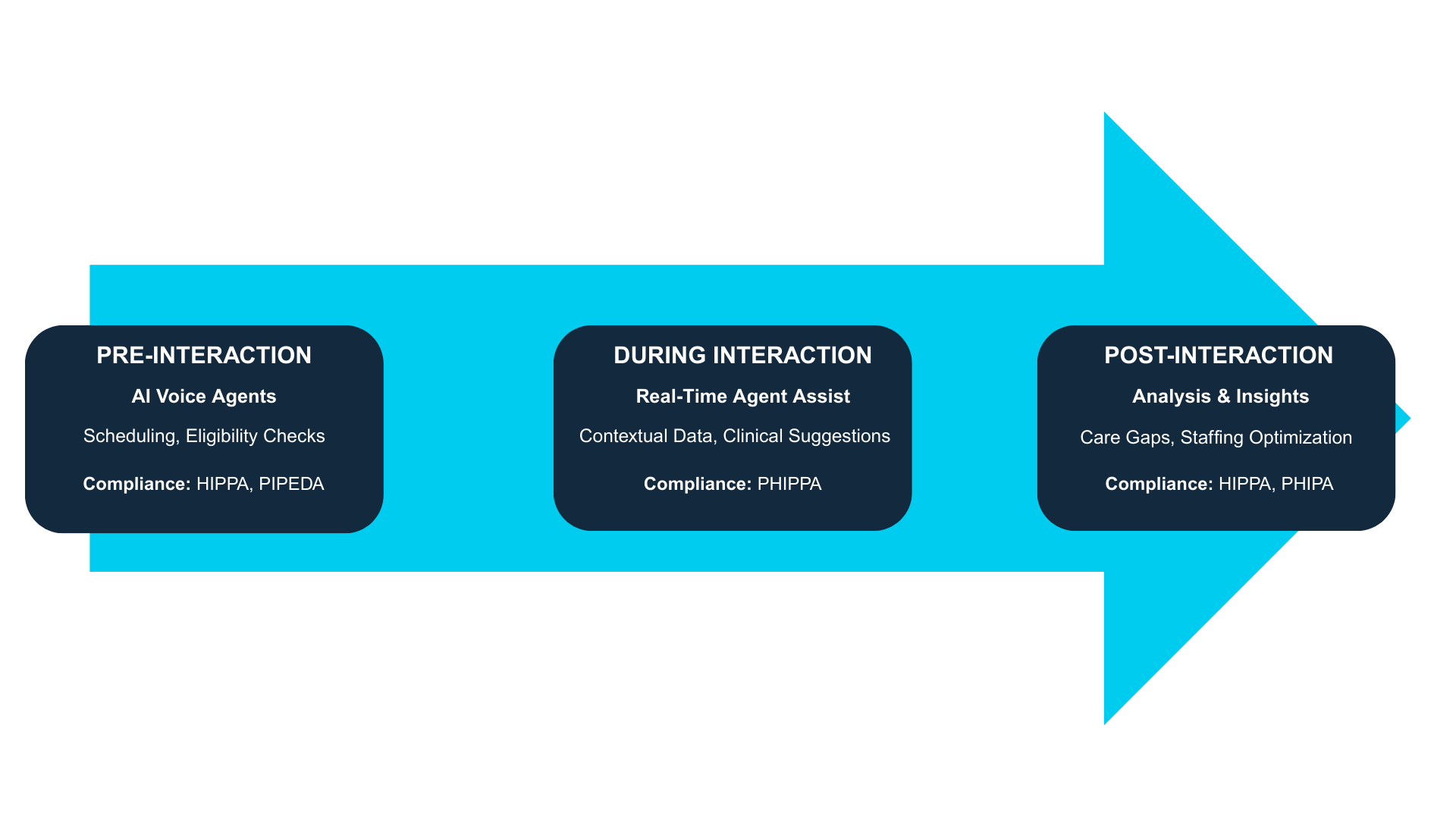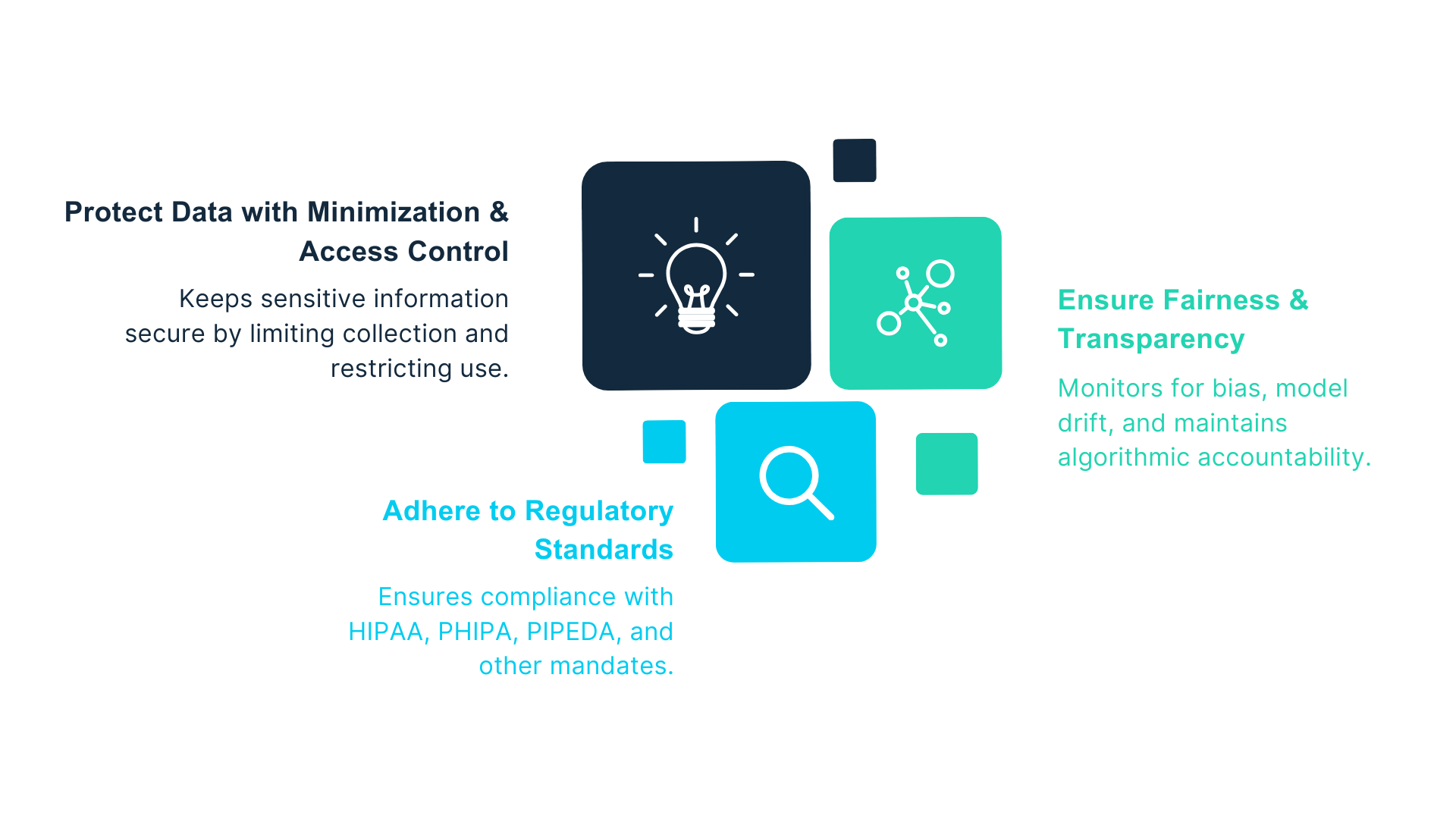The healthcare industry is evolving rapidly in response to increasing patient demands, staff shortages, and operational inefficiencies. At the heart of this transformation is Agentic AI intelligent, autonomous systems capable of planning, adapting, and acting with minimal human oversight.
Unlike traditional automation, Agentic AI is goal-driven, dynamic, and capable of handling complex healthcare workflows. It supports providers by enhancing clinical operations, improving administrative efficiency, and transforming patient engagement, all while aligning with strict industry regulations like HIPAA, PHIPA, and PIPEDA.
What Is Agentic AI?
Agentic AI refers to autonomous agents that not only respond to inputs but also proactively reason, learn, and make decisions to achieve a defined outcome. In healthcare, this means:
- Automating tasks that reduce physician burnout
- Guiding patients across their care journey
- Assisting agents during real-time interactions
- Delivering analytics and insights post-engagement
The result? Smarter operations, faster response times, and improved quality of care — all while maintaining compliance and data privacy.
Targeting Key Challenges in Healthcare
Healthcare organizations are turning to Agentic AI to address some of their most persistent challenges:

According to McKinsey, up to 25% of healthcare tasks could be automated using current technology — freeing up clinicians to focus more on care delivery. [1]
Real-World Impact
OTK (ontrak health) is a publicly traded healthcare BPO, specializing in behavioral health coaching faced persistent challenges: underperforming patient outreach, legacy systems that hindered responsiveness, multiple vendors complicating workflows, and fragmented communication channels.
The intervention: They deployed a cloud-native AI-powered contact center platform capable of:
- Integrating with proprietary healthcare CRM systems
- Automating multichannel outreach (voice, SMS, email)
- Enabling real-time load balancing and AI-enhanced quality management
- Ensuring full adherence to security and compliance standards (e.g. HIPAA) [2]
The outcome:
- Consistently exceeded recruitment goals on 93% of business days
- Improved both agent efficiency and patient experience
- Reduced vendor complexity and associated costs
- Streamlined SMS outreach using a single number per patient, maintaining compliance and better management of communication
This underscores how Agentic AI can deliver measurable improvements in engagement and operational efficiency, while safeguarding patient privacy and data security.
Three Phases of AI Implementation in Healthcare
Agentic AI implementation can be approached in three phases to maximize patient experience and operational efficiency while ensuring compliance:
Phase 1: Pre-Interaction: AI Voice Agents
AI voice bots engage patients before any human intervention by:
- Collecting insurance details
- Booking appointments
- Conducting eligibility checks
Compliance considerations: Encrypted data transmission, consent capture, and secure authentication aligned with PIPEDA and HIPAA.
Phase 2: During Interaction: Real-Time Agent Assist
AI enhances live consultations or customer service calls by:
- Displaying contextual patient data
- Providing clinical suggestions
- Transcribing conversations for EMR integration
Compliance considerations: Role-based access control, real-time redaction of PII, and data retention policies in accordance with PHIPA.
Phase 3: Post-Interaction: Analytics & Continuous Learning
AI agents analyze data post-consultation to:
- Flag care gaps and follow-ups
- Improve patient satisfaction metrics
- Optimize workforce planning and scheduling
Compliance considerations: Anonymization, audit trails, and governance frameworks supporting ongoing risk management.

Built for Seamless Integration
Agentic AI is designed to integrate with existing tools:
- EMR systems (Epic, Cerner)
- CRM platforms (Salesforce Health Cloud, Microsoft Dynamics)
- Contact center solutions (Genesys, Five9)
Through secure APIs and middleware, these agents operate as an interoperable layer, allowing healthcare organizations to extract more value from their current infrastructure.
Why Now?
The need to do more with fewer resources has never been greater. By applying Agentic AI across operational and clinical domains, healthcare leaders can:
- Increase patient throughput
- Enhance care quality
- Maintain strict compliance
- Enable more efficient, data-driven decision-making
According to a McKinsey report, AI, including machine learning and deep learning—has the potential to generate net savings of between $200 billion and $360 billion in global healthcare spending. This includes improvements in both clinical and operational workflows.
A Responsible, Compliant Approach to AI Adoption
While the promise of AI is compelling, implementation must be carefully managed. Strong data governance, ethical use policies, and ongoing compliance audits are non-negotiable.
At every phase, organizations must:

With the right guardrails, Agentic AI becomes not just a tool for automation, but a partner in delivering patient-first, regulation-ready care.
Prepared By:
Devleena Paul, Senior Project Manager
Ready to Take the First Step?
Organizations that strategically implement Agentic AI will gain a long-term competitive edge. Connect with our team today to determine how you can responsibly implement Agentic AI in your healthcare system.
Further Reading
Effective adoption of Agentic AI starts with governance. Learn more about building robust data governance frameworks for AI.
